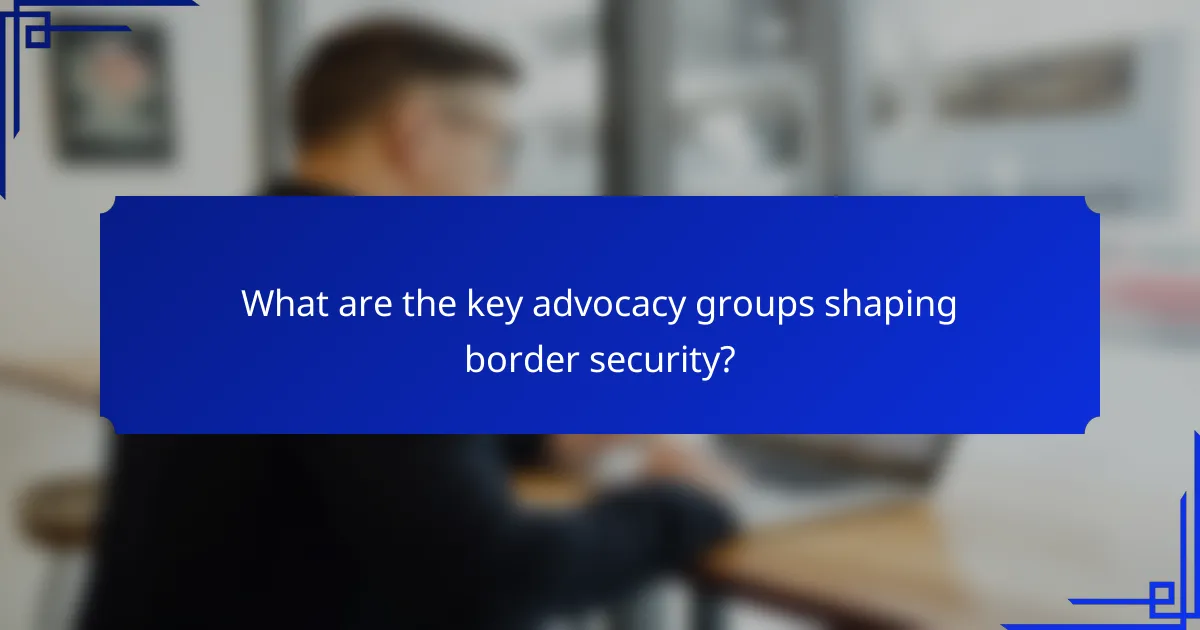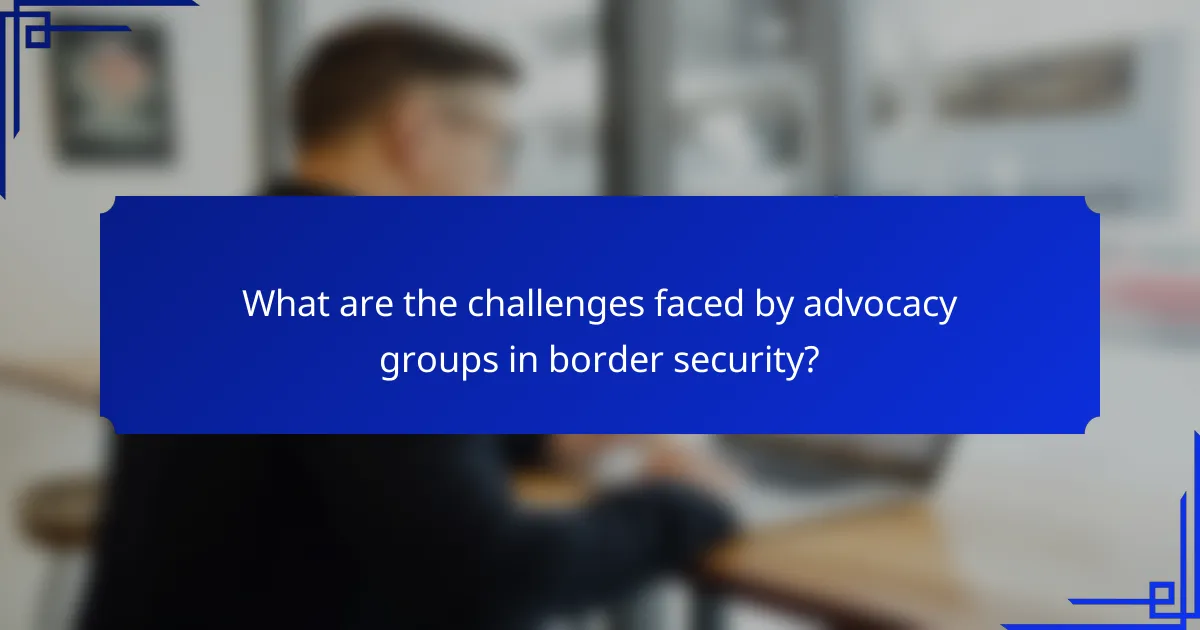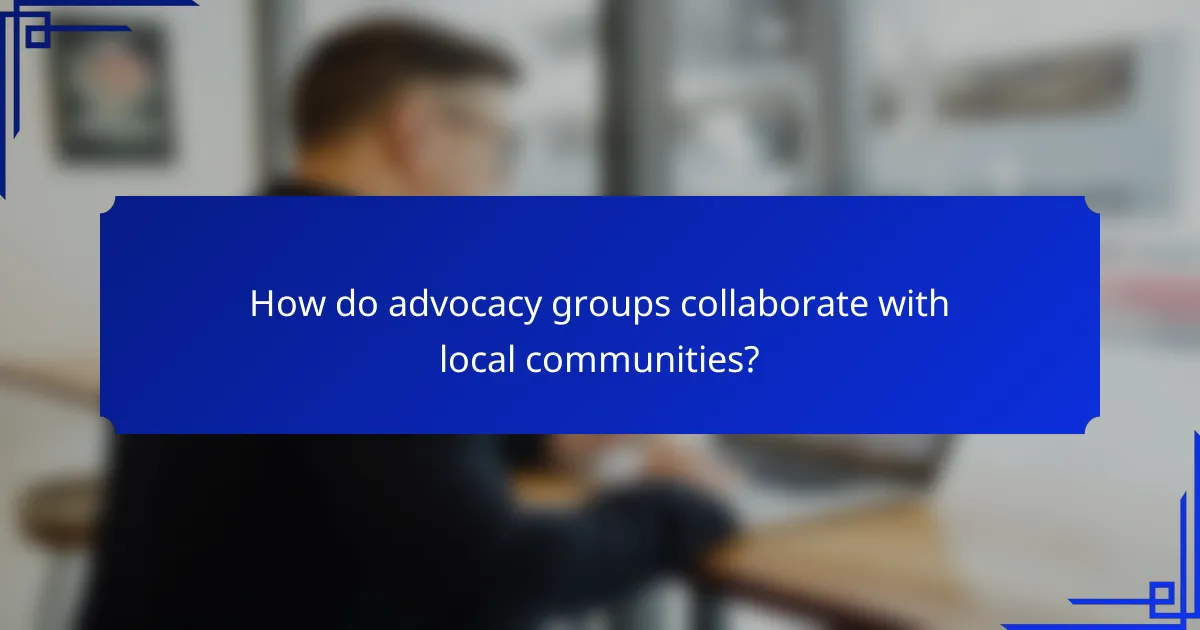Advocacy groups have become pivotal in shaping border security policy in the United States, particularly in the wake of Brian Terry’s tragic death. By lobbying for reforms, raising public awareness, and collaborating with lawmakers, these organizations address critical issues such as human rights and immigration reform. Their efforts not only influence legislation but also shift public perception regarding border security, highlighting the need for systemic change.

How do advocacy groups influence border security policy in the United States?
Advocacy groups play a significant role in shaping border security policy in the United States by lobbying for specific changes, raising public awareness, and collaborating with lawmakers. Their efforts can lead to substantial shifts in legislation and public perception regarding border security issues.
Direct lobbying efforts
Advocacy groups engage in direct lobbying by meeting with lawmakers and their staff to present their positions on border security. They often provide research, data, and personal stories to persuade legislators to support or oppose specific policies. This direct interaction can significantly impact legislative outcomes, especially when groups represent large constituencies or have substantial funding.
For example, organizations focused on immigration reform may lobby for policies that prioritize humanitarian considerations over strict enforcement measures. Their efforts often include organizing meetings, providing testimony at hearings, and mobilizing constituents to contact their representatives.
Public awareness campaigns
Public awareness campaigns are crucial for advocacy groups aiming to influence border security policy. These campaigns often utilize social media, traditional media, and community events to educate the public about their positions and the implications of current policies. By raising awareness, they can shift public opinion, which in turn pressures lawmakers to act.
For instance, campaigns highlighting the human impact of border security measures can generate empathy and support for reform. Effective messaging can lead to increased public engagement and support for advocacy initiatives.
Collaboration with lawmakers
Collaboration with lawmakers is a strategic approach used by advocacy groups to influence border security policy. By working closely with sympathetic legislators, these groups can help draft legislation that aligns with their goals. This partnership often involves providing expertise and resources that lawmakers may lack.
Such collaborations can result in more informed policy decisions and can help ensure that the concerns of affected communities are represented in new legislation. Regular communication and joint initiatives can strengthen these relationships and enhance the effectiveness of advocacy efforts.
Research and policy analysis
Advocacy groups conduct research and policy analysis to support their positions on border security. By providing data-driven insights, they can effectively argue for or against specific policies. This research often includes studies on the economic, social, and humanitarian impacts of border security measures.
For example, a group may analyze the effects of increased border enforcement on local economies or the well-being of immigrant communities. This evidence can be pivotal in persuading lawmakers and the public to consider alternative approaches to border security.
Grassroots mobilization
Grassroots mobilization involves rallying community members to advocate for border security policy changes. Advocacy groups often organize events, campaigns, and initiatives that encourage individuals to voice their opinions to lawmakers. This approach can amplify the impact of their lobbying efforts.
Effective grassroots mobilization can include phone banks, letter-writing campaigns, and public demonstrations. Engaging community members not only raises awareness but also creates a sense of urgency around border security issues, prompting lawmakers to take action in response to constituent concerns.

What are the key advocacy groups shaping border security?
Several advocacy groups play a critical role in shaping border security policies, focusing on human rights, immigration reform, and community safety. These organizations work to influence legislation and public opinion through research, advocacy, and grassroots mobilization.
American Civil Liberties Union (ACLU)
The ACLU is a prominent organization that advocates for civil liberties and human rights in the context of border security. They challenge policies that they believe violate constitutional rights, such as unlawful detentions and racial profiling at the border.
Through litigation and public campaigns, the ACLU seeks to ensure that border security measures do not infringe upon individual freedoms. Their work includes monitoring government actions and providing legal support to those affected by unjust practices.
Border Angels
Border Angels focuses on humanitarian efforts along the U.S.-Mexico border, advocating for the rights of migrants and promoting awareness of the dangers they face. The organization conducts outreach programs that provide water, food, and medical assistance to those crossing the border.
By highlighting the human aspect of border security, Border Angels aims to influence policies that prioritize compassion and safety over punitive measures. Their advocacy includes educational campaigns to inform the public about the realities of migration.
National Immigration Forum
The National Immigration Forum works to promote the value of immigration and advocate for comprehensive immigration reform. They engage with policymakers, business leaders, and community organizations to foster a more inclusive approach to border security.
Through research and advocacy, the Forum emphasizes the economic and social benefits of immigration, arguing for policies that balance security with humane treatment of migrants. Their initiatives often include coalition-building and public awareness campaigns.
Human Rights First
Human Rights First is dedicated to protecting the rights of refugees and asylum seekers, particularly in the context of border security. They advocate against policies that undermine the right to seek asylum and promote accountability for human rights violations.
The organization conducts research and provides legal assistance to individuals facing deportation or detention. Their work aims to ensure that border security measures comply with international human rights standards, emphasizing the need for fair treatment of all individuals at the border.

What impact did Brian Terry’s case have on advocacy efforts?
Brian Terry’s case significantly influenced advocacy efforts by highlighting the need for reform in border security policies. His tragic death brought attention to the flaws in existing systems and galvanized various groups to push for changes in legislation and enforcement practices.
Increased public scrutiny
The circumstances surrounding Brian Terry’s death led to heightened public scrutiny of border security measures and law enforcement practices. Advocacy groups began to mobilize citizens to demand accountability and transparency from government agencies involved in border management.
Public forums, social media campaigns, and community meetings became common platforms for discussing border security issues. This grassroots engagement empowered individuals to voice their concerns and push for reforms.
Legislative changes
In response to the advocacy efforts spurred by Terry’s case, several legislative changes were proposed at both state and federal levels. Lawmakers began to consider reforms aimed at improving oversight of border security operations and increasing funding for effective enforcement strategies.
Key proposals included measures to enhance training for border agents and to implement stricter regulations on the use of firearms in border enforcement. These changes aimed to prevent future tragedies and ensure that border security practices align with community safety standards.
Heightened media attention
The media played a crucial role in amplifying the impact of Brian Terry’s case on advocacy efforts. Coverage of the case brought national attention to issues of border security and the challenges faced by law enforcement agencies.
Investigative reports and opinion pieces highlighted the complexities of border enforcement and the need for comprehensive reforms. This media attention not only informed the public but also pressured policymakers to take action in response to the growing demand for change.

What are the challenges faced by advocacy groups in border security?
Advocacy groups in border security encounter several significant challenges that hinder their effectiveness. These include political opposition, funding limitations, and public perception issues, all of which can impact their ability to influence policy and promote their agendas.
Political opposition
Political opposition is a major hurdle for advocacy groups focused on border security. Different political parties often have contrasting views on immigration and border policies, leading to a polarized environment. This division can make it difficult for advocacy groups to gain bipartisan support for their initiatives.
For example, a group advocating for more stringent border security measures may face pushback from organizations that prioritize humanitarian approaches. This conflict can stall legislative progress and limit the effectiveness of advocacy efforts.
Funding limitations
Funding limitations significantly affect the operations of advocacy groups in border security. Many organizations rely on donations, grants, and government funding, which can be inconsistent and insufficient. This financial instability can restrict their ability to conduct research, run campaigns, or engage in lobbying activities.
Additionally, competition for funding among various advocacy groups can dilute resources. Groups may need to prioritize their initiatives based on available funding, which can lead to a narrow focus and reduced impact on broader border security issues.
Public perception issues
Public perception issues pose a challenge for advocacy groups working in border security. Misunderstandings and misinformation about their goals can lead to negative public sentiment, making it harder for these organizations to rally support. Advocacy groups must work diligently to educate the public about their missions and the complexities of border security.
For instance, if a group is perceived as solely focused on strict enforcement, they may alienate potential allies who advocate for comprehensive immigration reform. Building a positive public image is essential for gaining support and influencing policy changes effectively.

How do advocacy groups collaborate with local communities?
Advocacy groups collaborate with local communities by engaging in various initiatives that address border security concerns while fostering community involvement. These collaborations often focus on outreach, legal support, and education to empower residents and promote informed dialogue.
Community outreach programs
Community outreach programs are essential for building trust and understanding between advocacy groups and local residents. These programs often include town hall meetings, community forums, and door-to-door campaigns to gather input and share information about border security issues.
For example, advocacy groups may organize events where community members can voice their concerns and learn about local policies. This direct engagement helps ensure that the voices of residents are heard in discussions about border security measures.
Legal assistance initiatives
Legal assistance initiatives provide critical support to individuals affected by border security policies. Advocacy groups often partner with legal experts to offer free or low-cost legal services, helping community members navigate complex immigration laws and regulations.
These initiatives may include workshops on rights and legal options, as well as direct representation for those facing deportation or other legal challenges. By empowering individuals with legal knowledge, advocacy groups help protect their rights and promote fair treatment.
Educational workshops
Educational workshops are designed to inform community members about border security issues and their implications. These workshops cover a range of topics, including immigration laws, community safety, and the impact of border policies on local economies.
Advocacy groups often collaborate with local experts to deliver these workshops, ensuring that the information is accurate and relevant. Participants leave with a better understanding of how border security affects their lives and the tools to engage in advocacy efforts effectively.
